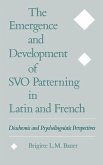This volume explores the question of why languages - even those spoken in the same geographical area by people who share similar social structures, occupations, and religious beliefs - differ in the meanings expressed by their grammatical systems. Zygmunt Frajzyngier and Marielle Butters outline a new methodology to explore these differences, and to discover the motivations behind the emergence of meanings. The motivations that they identify include: the communicative need triggered when the grammatical system inherently produces ambiguities; the principle of functional transparency; the opportunistic emergence of meaning, whereby unoccupied formal niches acquire a new function; metonymic emergence, whereby a property of an existing function receives a formal means of its own, thus creating a new function; and the emergence of functions through language contact. The book offers new analyses of a range of phenomena across different languages, such as benefactives and progressives in English, and point of view of the subject and goal orientation in Chadic languages. It also draws on a wealth of data from other languages including French, Spanish, Polish, Russian, and a variety of less familiar Sino-Russian idiolects.
Dieser Download kann aus rechtlichen Gründen nur mit Rechnungsadresse in A, B, BG, CY, CZ, D, DK, EW, E, FIN, F, GR, HR, H, IRL, I, LT, L, LR, M, NL, PL, P, R, S, SLO, SK ausgeliefert werden.









